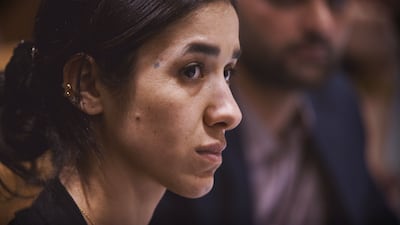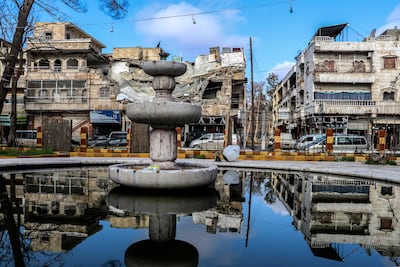A former employee of cement company Lafarge says he hopes he will see justice after a French court ruled the firm will face charges of crimes against humanity for its actions during the Syrian civil war.
Mohammad is one of 11 former employees of the French company's Syrian subsidiary who are taking taking legal action against the French company.
They are being joined in the case by the European Centre for Constitutional and Human Rights, and anti-corruption group Sherpa.
Lafarge is accused of paying ISIS and other armed groups €13 million ($14.1 million) to allow it to keep operating in Syria during the civil war, while keeping its Syrian employees on duty despite the risks.
France’s Supreme Court has ruled Lafarge can now face charges of crimes against humanity.
The case was first taken to court in 2016 and the lengthy legal battle is one of the most complex cases in French corporate history.
But Lafarge won a partial victory when the court dropped the charge of endangering the lives of its former Syrian employees, ruling that safety protection under French labour law did not apply to them.
Sherpa said a criminal investigation revealed that the Syrian workers, including those suing the company, may have been at risk of death, injury and kidnapping.
The cement maker admitted after its own internal investigation that its Syrian subsidiary paid armed groups to help protect staff at the plant during the civil war.
But it has strenuously denied endangering the lives of its local staff by making them continue to work in an unsafe situation and that it was complicit in crimes against humanity committed by militias.
After the ruling, Mohammad said he and the other workers “will continue to demand the justice we deserve”.

He told The National he began working for Lafarge in 2011, the year the civil war broke out, after moving from Damascus where he was brought up and went to university.
The war began as protests against the regime of Syrian President Bashar Al Assad.
The company owned a cement factory in the north of Syria, between Raqqa and Manbij, which it bought in 2008 for €680 million.
Mohammad said that at first he said was “very excited” to be working for a multinational company but soon the area around the plant became engulfed in the civil war.
The factory was in an area controlled by Kurdish militia who manned checkpoints that employees had to pass through, he said.
At that point Lafarge told its Syrian national employees to move to the city of Manbij, about an hour’s drive away.
“When they began to evacuate, the expats from the factory raised the question ‘What about the Syrian people?’ and they said, ‘There is no evacuation plan for you’.”
Other French companies, including oil giant Total, closed their operations in Syria after the EU imposed an arms and oil embargo after the civil war broke out, but Lafarge stayed.

With Manbij in the hands of its opponents, the city became a target for regime air strikes.
In August 2012, Mohammad managed to evacuate his wife and daughter to Turkey and then returned to keep working.
The day after he arrived back home, his neighbourhood was destroyed by a regime air strike.
“I was sleeping for a little bit after coming back from work, maybe for five minutes, then I heard a bomb and I just jumped up and then on to the floor. I survived death.
“The next day I went to the factory and said, ‘Did you see what happened, what shall I do?’.
"And they said, ‘We cannot protect you’. I told them that if they can’t protect me I can’t remain in Syria so they fired me.”
Mohammed went to join his family in Turkey and eventually they settled in Germany, where he works as a manager for a large business.
Looking back at his experience, he described it “as a terrible time for me and my family”.
“There are a lot of people who have been kidnapped and disappeared but nobody from Lafarge took any action, so maybe by being part of this case I can be the voice of these people who have disappeared," Mohammad said.
"Maybe I can represent the orphans and the widows, so that’s why I’m in this case.”
The decision comes after Lafarge, now a part of the Swiss conglomerate, Holcim, pleaded guilty in a US court to providing support to ISIS in Syria and agreed to forfeit $687 million and pay a $90 million fine in 2022.
Lafarge is facing another lawsuit, brought in the US by Nobel prize winner Nadia Murad, one of more than 400 Yazidis who have filed a court case against the company.
They charge that it conspired to provide material support to a campaign of terrorism by ISIS against the Yazidi population.
In a statement, Lafarge said: “This is a legacy issue, which Lafarge SA is addressing through the legal process in France.”


